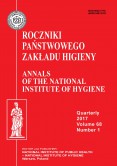Rocz Panstw Zakl Hig 2013, 64(4): 339-344
Determining the effect of consuming fermented milk drinks on the incidents of constipation, diarrhoea and resistance to respiratory illness.
[Determining the effect of consuming fermented milk drinks on the incidents of constipation, diarrhoea and resistance to respiratory illness.]
ABSTRACT
Introduction. At present, there are many types of milk fermented drinks/beverages on the market that often contain added probiotic microflora. Numerous studies indicate that such products are frequently consumed by adolescents. Within this group, symptoms of respiratory illness feature prominently as well as various and frequent disorders of the gastro-intestinal system that give rise to either constipation or diarrhoea.
Objectives. To determine the effect of consuming fermented milk drinks on the immune systems in teenagers aged 13-16 years through analysing their intakes in relation to how often respiratory illness, constipation and diarrhoea had occurred.
Material and Methods. A survey was performed on 150 middle-school pupils aged 13-16 years. Correlation coefficients were determined between the frequency of consuming fermented drinks with the incidences of respiratory disease, constipation or diarrhoea.
Results. Most subjects declared that their state of health was satisfactory and that they regularly ate meals. Those consuming fermented milk drinks for over a year constituted 88%. It was found that 56% of all subjects drank such beverages at least once daily or several times a week. The decrease observed in consuming these drinks resulted in increasing problems of bowel evacuation ranging from 3% in those drinking daily to 26% that drank less than once monthly. The incidence of respiratory tract illness was seen to rise whenever fewer fermented milk beverages were consumed. Analogous findings were seen also in the incidence of diarrhoea. Subjects also considered that such drinks improved health and yoghurts were the most frequent type of these drinks consumed.
Conclusions. Gastro-intestinal function may be enhanced by regular consumption of fermented milk drinks together with a decreased incidence of respiratory tract illness. However, the effect of how often such drinks are consumed on the aforementioned conditions remains unresolved.
STRESZCZENIE
Wprowadzenie. Obecnie na rynku dostępnych jest szereg mlecznych napojów fermentowanych. Wiele z nich zawiera dodatkowo mikroflorę probiotyczną. Liczne badania pokazują, że młodzi ludzie chętnie spożywają tego typu napoje. Choroby dróg oddechowych są bardzo częste wśród młodzieży. Spośród dolegliwości układu pokarmowego nierzadkim problemem są zaparcia oraz biegunki.
Cel badań. Celem pracy było ocena wpływu spożywania mlecznych napojów fermentowanych na odporność organizmu nastolatków w wieku 13-16 lat poprzez analizę zależności pomiędzy częstotliwością spożywania napojów fermentowanych a występowaniem biegunek, zaparć oraz chorób dróg oddechowych.
Materiał i metoda. Analiz dokonywano na podstawie badań ankietowych przeprowadzonych wśród 150 uczniów gimnazjów w wieku 13-16 lat. W pracy wyliczano współczynniki korelacji pomiędzy spożywaniem mlecznych napojów fermentowanych a występowaniem biegunek, zaparć oraz chorób dróg oddechowych.
Wyniki. Badana grupa młodzieży w większości deklarowała dobry stan zdrowia oraz regularnie się odżywiała. Udział osób deklarujących spożywanie mlecznych napojów fermentowanych dłużej niż rok wyniósł 88 %. 56 % badanych gimnazjalistów spożywało mleczne napoje fermentowane codziennie lub kilka razy w tygodniu. Spadek częstotliwości spożycia napojów fermentowanych wśród gimnazjalistów spowodował zwiększenie udziału procentowego osób deklarujących problemy z wypróżnianiem z 3 %, dla osób spożywających napoje fermentowane codziennie, do 26 % dla spożywających je rzadziej niż raz w miesiącu. Procentowy udział osób z często występującymi infekcjami dróg oddechowych wzrastał wraz ze spadkiem częstotliwości spożywania mlecznych napojów fermentowanych. Podobne zależności stwierdzono w przypadku występowania biegunek. Ankietowani sądzą, że mleczne napoje fermentowane mogą przyczyniać się do wzmocnienia organizmu. Respondenci spośród mlecznych napojów fermentowanych najczęściej wybierali jogurty.
Wnioski. Regularne spożywanie mlecznych napojów fermentowanych może korzystnie wpływać na regulację pracy przewodu pokarmowego oraz rzadsze występowanie infekcji układu oddechowego. Nie wykazano jednoznacznego wpływu długości okresu spożywania mlecznych napojów fermentowanych na oceniane przypadłości.
Liczba pobrań: 2385


